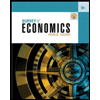Suppose that the required reserve ratio is 8%, currency in circulation is $600 billion, the amount of checkable deposits is $890 billion, and excess reserves are $15 billion. The money supply is $ 1490 billion. 600 billion + 890 billion = 1490 billion The currency deposit ratio is 0.67. 600/890 = 0.67 The excess reserve ratio is 0.16 or 0.02 (if we are rounding). 15/890 = 0.169 The money multiplier is 12.5 1/%8 = 1/0.08 =12.5 Suppose the central bank conducts an unusually large open market purchase of bonds held by banks of $1,300 billion due to a sharp contraction in the economy. Assuming the ratios you calculated in the previous steps are the same, the money supply should (1) _____ to $ 17,740 billion. 1300 x 12.5 = 16250 + 1490 = (the top part is just up to provide a reference for the bottom question) Suppose the central bank conducts the same open market purchase as in the previous step, except that banks choose to hold all of these proceeds as excess reserves rather than loan them out, due to fear of a financial crisis. The Open mmarket price is 17,740 billion. Assuming that currency and deposits remain the same, the new amount of excess reserves is $ ________ billion? The new excess reserve ratio is _______? The money supply is $ _____________billion? The money multiplier is ___________?
Suppose that the
The money supply is $ 1490 billion.
600 billion + 890 billion = 1490 billion
The currency deposit ratio is 0.67.
600/890 = 0.67
The excess reserve ratio is 0.16 or 0.02 (if we are rounding).
15/890 = 0.169
The money multiplier is 12.5
1/%8 = 1/0.08 =12.5
Suppose the central bank conducts an unusually large open market purchase of bonds held by banks of $1,300 billion due to a sharp contraction in the economy.
Assuming the ratios you calculated in the previous steps are the same, the money supply should (1) _____
to $ 17,740 billion. 1300 x 12.5 = 16250 + 1490 =
(the top part is just up to provide a reference for the bottom question)
Suppose the central bank conducts the same open market purchase as in the previous step, except that banks choose to hold all of these proceeds as excess reserves rather than loan them out, due to fear of a financial crisis.
The Open mmarket price is 17,740 billion.
Assuming that currency and deposits remain the same, the new amount of excess reserves is $ ________ billion?
The new excess reserve ratio is _______?
The money supply is $ _____________billion?
The money multiplier is ___________?
Trending now
This is a popular solution!
Step by step
Solved in 3 steps









